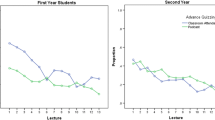Abstract
A new teaching method based on positively reinforcing attempts at mastery was introduced and empirically tested to determine its validity. The program, labeled Programmed Achievement Study System (PASS), makes use of traditional learning principles by providing rewards (bonus points) contingent upon reaching specified mastery criteria. Specifically, college students enrolled in introductory psychology were awarded additional points if they demonstrated mastery of concept areas on retake quizzes administered during a given week. PASS students, as compared to a control condition, demonstrated higher performance on a final examination given at the end of the semester. These results suggest that the PASS contingencies are preferable to those contingencies operating in more traditional classrooms. A theoretical rationale based on the principles of operant conditioning is discussed.
Similar content being viewed by others
References
Haddad, N. F., Nation, J. R., and Williams, J. D. Programmed student achievement: A Hawthorne effect?Research in Higher Education 1975,3 315–322.
Keller, F. S. “Good-bye, teacher...”Journal of Applied Behavior Analysis 1968,1 78–89.
Keller, F. S. Ten years of personalized instruction.Teaching of Psychology 1974,1 (1), 4–9.
Knight, J. M., Williams, J. D., and Jardon, J. The effects of contingency avoidance on programmed student achievement.Research in Higher Education 1975,3 11–17.
Lamberth, J., and Knight, J. M. An embarrassment of riches: Effectively teaching and motivating large introductory psychology sections.Teaching of Psychology 1974,1 (1), 16–20.
Nation, J. R., Knight, J. M., Lamberth, J., and Dyck, D. G. Programmed student achievement: A test of the avoidance hypothesis.Journal of Experimental Education 1974,42 57–61.
Nation, J. R., and Roop, S. S. A comparison of two mastery approaches to teaching introductory psychology.Teaching of Psychology 1975,2 (3), 108–111.
Vernon, W. M.Introductory psychology: A mastery coursebook with performance objectives. Chicago: Rand McNally, 1974.
Williams, J. L.Operant learning: procedures for changing behavior. Monterey, CA: Brooks/Cole Publishing Co., 1973.
Author information
Authors and Affiliations
Rights and permissions
About this article
Cite this article
Nation, J.R., Bourgeois, A.E. PASS, an alternative method of teaching introductory psychology. Res High Educ 8, 273–282 (1978). https://doi.org/10.1007/BF00992091
Issue Date:
DOI: https://doi.org/10.1007/BF00992091




